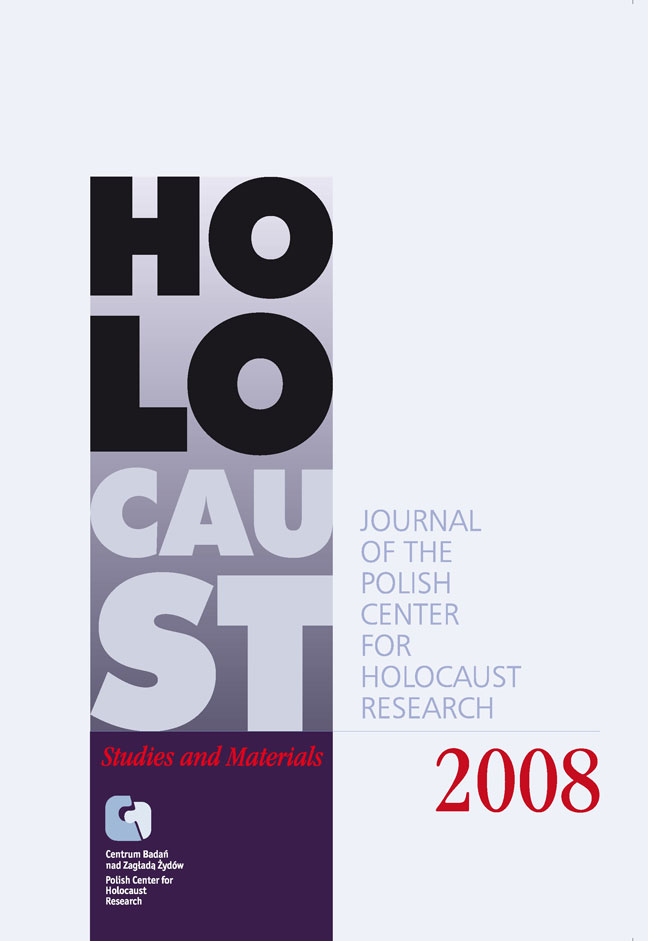Understanding the Holocaust. A Task for Generations
Zagłada Żydów. Studia i Materiały, 2008: Holocaust Studies and Materials, pages: 11-20
Publication date: 2008-12-01
Abstract
The Holocaust destroyed virtually the entire Jewish community in Poland. Zusman Segałowicz, the pre-war chairman of the Jewish Union of Writers and Journalists of 13 Tłomackie Street, Warsaw, managed to leave Warsaw in 1939 and via Vilna, Kaunas, Bulgaria, Turkey, and Syria reached Palestine, where, under the beating Tel-Aviv sun, he pondered on the burning ruins of the ghetto. His memoirs, published in 1946 in Argentina (the author died in New York in 1949), contain the following passage: I pass conflagration sites. I dig in the ashes. For the time being, these are the ashes of 13 Tłomackie St. All that is left of the entire Jewish world in Poland is a cemetery. Sometimes our pain leads us to divide this great cemetery into individual, smaller cemeteries: the cemetery of the Hassidic world, the cemetery of Jewish workers, merchants, entrepreneurs and industrialists, the cemetery of Jewish children who were to be our future. Finally, our thoughts run toward the cemetery of the Jewish spirit: the theatre, music, art, journalism and literature. We cannot depart from any of these cemeteries, but, at the same time, we should not come too close, for it could drag one into its endless abyss. What are we to do then? Shout? The dead won't hear us, and the world of the living is more dead than the world of the dead.
The Holocaust happened on our soil, in full view of Polish society, and it is an integral part – whether one wants it or not – of Polish history. For the Poles, the experience of the Holocaust remains a unique event and carries extraordinary responsibilities. Nevertheless, in terms of social awareness, the Shoah seems to belong to Jewish rather than to Polish history. Even today many Poles feel ill at ease, threatened or outright disappointed by the Jewish perceptions of the Holocaust and oftentimes the Jews are seen as rivals in the martyrology competition. Despite the recent historical research and public debates, culminating with the discussion around the Jedwabne crime, Polish society largely ignores the issues related to the Holocaust. Still too many myths and lies find their way to the public sphere and enter public circulation. This state of affairs is related, to a certain extent, to the sad legacy of decades of censorship and neglect under the communist rule. We believe that this should change. This is why we shall link research with educational activities in order to foster the knowledge of issues related to the Holocaust.
Keywords
Holocaust, methodology of History, memoirs, diaries, accounts
License
Copyright (c) 2008 Zagłada Żydów. Studia i Materiały

This work is licensed under a Creative Commons Attribution-NonCommercial-NoDerivatives 4.0 International License.
https://creativecommons.org/licenses/by-nc-nd/4.0
Other articles by the same auhtor(s)
- Jacek Leociak, Marta Tomczok, Affective Holocaust Kitsch – Introduction , Zagłada Żydów. Studia i Materiały: No. 17 (2021)
- Jacek Leociak, Adam Mazur, Artur Żmijewski, “Berek is a voice of powerlessness in the face of cruelty; the desire that the Holocaust would not happen.” Jacek Leociak and Adam Mazur talk to Artur Żmijewski , Zagłada Żydów. Studia i Materiały: No. 17 (2021)
- Dariusz Libionka, Jacek Leociak, 75th Anniversary of Operation Reinhardt , Zagłada Żydów. Studia i Materiały: No. 13 (2017)
- Jacek Leociak, Editors, From the editors , Zagłada Żydów. Studia i Materiały: No. 5 (2009)
- Jacek Leociak, Literature of the Personal Document as a Source in Holocaust Research (a Methodological Reconnaissance) , Zagłada Żydów. Studia i Materiały: No. 1 (2005)
- Jacek Leociak, Ewa Wiatr, Krystyna Radziszewska (red.), Oblicza getta. Antologia tekstów z getta łódzkiego , Zagłada Żydów. Studia i Materiały: No. 16 (2020)
- Jacek Leociak, Ginczanka , Zagłada Żydów. Studia i Materiały: No. 11 (2015)
- Jacek Leociak, “… I Have Been Talking with God (You Are Smiling! He Is the Only One I Can Still Talk To!).” Prayer Lamentations in Karol Rotgeber’s Warsaw Ghetto Memoir , Zagłada Żydów. Studia i Materiały: No. 15 (2019)
- Jacek Leociak, Literature of the Personal Document as a Source in Holocaust Research (a Methodological Reconnaissance). , Zagłada Żydów. Studia i Materiały: 2008: Holocaust Studies and Materials
- Jacek Leociak, Redakcja Czasopisma, Discourse of Help , Zagłada Żydów. Studia i Materiały: No. 4 (2008)
 English
English
 Polish
Polish




